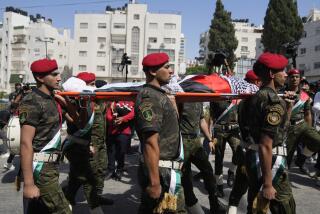Palestinian officials accuse Israel of torturing inmate to death
JERUSALEM — As unrest surged across the West Bank, Palestinian officials accused Israel on Sunday of torturing to death a 30-year-old West Bank man who was arrested last week on suspicion of throwing rocks at settlers. Israeli officials said there were no signs he was mistreated and it remains unclear how he died.
The death Saturday of Arafat Jaradat, a married father of two who worked at a gas station in a village near Hebron, touched off a day of protests and rioting, heightening fears that Palestinian frustration levels are reaching a boiling point that could explode into another uprising.
Israel’s treatment of Palestinian prisoners had already sparked a week of demonstrations in support of four other detainees whose health has deteriorated as a result of their months-long hunger strike.
After an autopsy Sunday conducted by Israel and observed by a Palestinian doctor, Palestinian Prisoner Affairs Minister Issa Qaraqi said Jaradat’s body was bruised and showed signs of being beaten on the chest, back, arms and mouth.
“It is obvious that Arafat underwent severe torture during interrogation that caused him a psychological shock that led to his immediate death,” Qaraqi said Sunday night. “It seems he was in a slaughterhouse. Israel should not be allowed to get away with this.”
He rejected initial Israeli claims that Jaradat had a heart attack. Palestinians officials are calling for an international inquiry into the conditions of Israel’s jails and the circumstances of Jaradat’s death.
Israeli officials disputed those conclusions and said the exact cause of death will not be known until toxicology and other tests are completed. The marks on Jaradat’s body were consistent with those that would occur during resuscitation attempts, according to a Health Ministry statement. Those injuries included two internal hemorrhages on the shoulder and chest, two broken ribs and a small abrasion on the chest, the ministry said.
Israeli prison officials earlier said Jaradat had complained of feeling ill Saturday and received treatment from a doctor in his cell at Megiddo prison.
“We don’t know yet what happened,” said one senior Israeli official who was not authorized to speak publicly. “We have to wait for the autopsy results. But I can tell you that torture is against the law in Israel.”
Jaradat’s attorney, Kmeil Sabbagh, said that when he saw his client at a hearing Thursday, the man complained of being mistreated during interrogation and appeared to be suffering from back pain and anxiety. The man’s family said he was in good health before his arrest.
Jaradat’s body was returned to his family for burial, which is expected to take place Monday.
Even before the autopsy, clashes between Palestinian youths and Israeli soldiers broke out in several West Bank cities Sunday, including Hebron, Ramallah, Bethlehem and Jenin, and at checkpoints in East Jerusalem and south of Nablus.
Palestinians threw rocks and Molotov cocktails. Israeli soldiers used tear gas and rubber bullets. At least four protesters were seriously wounded, Palestinian officials said.
More than 4,500 Palestinian prisoners called for a one-day hunger strike Sunday to mourn Jaradat’s death.
Meanwhile, concern was growing over the health of the four prisoners who have been on hunger strike for several months. Three have been moved from a prison clinic to a hospital, according to Israeli Prison Authority spokeswoman Sivan Weizman.
Palestinian leaders have warned that the death of one of those four men could unleash a wave of violence that they might not be able to control.
In an effort to ease tension, Israel said Sunday that it would release a month’s worth of tax revenue, totaling about $100 million, to the cash-strapped Palestinian Authority. Israel started withholding the money in December in response to the United Nations vote upgrading the Palestinian Authority’s status in the international body to that of a nonmember “state.”
Some in Israel are warning that a combination of factors is creating a perfect storm that could trigger another Palestinian uprising. Such conditions include a stalled peace process, increased settlement construction and a recent increase in clashes between Palestinians and Jewish settlers.
On Saturday, Palestinians in the village of Kursa said nearby settlers attacked them, leading to clashes that Israeli soldiers broke up.
Palestinian hospital officials say two Palestinians were shot with live ammunition in the fight and one was seriously wounded. Palestinians accused settlers of shooting them, but settlers denied using deadly fire. The army said it would investigate the incident.
Israel on Sunday called upon the Palestinian Authority leadership to use its security forces to quell the growing violence, but the unrest also increases the pressure on Israeli Prime Minister Benjamin Netanyahu to improve prison conditions and restart formal peace talks, particularly in advance of President Obama’s expected trip to Israel next month.
Times special correspondent Abukhater reported from Ramallah. News assistant Batsheva Sobelman in The Times’ Jerusalem bureau contributed to this report.
More to Read
Sign up for Essential California
The most important California stories and recommendations in your inbox every morning.
You may occasionally receive promotional content from the Los Angeles Times.










